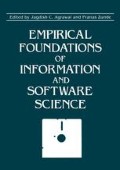Abstract
Modeling system structures of word meanings and/or world knowledge is to face the problem of their mutual and complex relatedness. In linguistic semantics, cognitive psychology, and knowledge representation most of the necessary data concerning lexical, semantic and/or external world information is still provided introspectively. In a rather sharp departure from that form of data acquisition the present approach has been based on the empirical analysis of discourse that real speakers/writers produce in actual situations of performed or intended communication in prescriptive contexts or subject domains. The approach makes essential use of statistical means to analyze usage regularities of words to map their fuzzy meanings and connotative interrelations in a format of stereotypes. Their dependencies are generated algorithmically as multi-perspective dispositions that render only those relations accessible to automatic processing which can - under differing aspects differently — be considered relevant. Generating such semantic dispositional dependencies dynamically by a procedure would seem to be an operational prerequisitie to and a promising candidate for the simulation of contents-driven (analogically-associative), instead of formal (logically-deductive) inferences in semantic processing.
Access this chapter
Tax calculation will be finalised at checkout
Purchases are for personal use only
Preview
Unable to display preview. Download preview PDF.
References
A. M Collins and M. R. Quillian, Retrieval time from semantic memory,Journal of Verbal Learning and Verbal Behavior, 1969,8, pp. 240 – 247
F. Klix, Strukturelle und Funktionelle Komponenten des Menschlichen Gedaechtnisses,Psychologische Beitraege zur Analyse Kognitiver Prozesse, F. Klix, ed., Akademie Verlag, Berlin, 1976, pp. 57 – 98
T. Winograd, Frame representation and the declarative/procedural controversy,Representation and Understanding Studies in Cognitive Science, D. G. Bobrow and A. Collins, eds., Academic Press, New York/San Francisco/London, 1975, pp. 185 – 210
A. M. Collins and E. F. Loftus, A spreading activation theory of semantic processing,Psychological Review, 1975,6, pp. 407 – 428
E. Rosch, Cognitive representations of semantic categories,Journal of Experimental Psychology: General, 1975,104, pp. 192 – 233
B.B Rieger, Feasible fuzzy semantics,Words, Worlds, and Contexts:New Approaches in Word Semantics, H. J. Eikmeyer and H. Rieser, eds.; De Gruyter, Berlin/New York, 1981, pp. 193 – 209
B.B Rieger, Bedeutungskonstitution. Bemerkungen zur Semiotischen Problematik eines linguistischen Problems,Zeitschrift fuer Linguistik und Literaturwissenschaft, 1977,27/28, pp. 55–68
L. Wittgenstein,Ueber Gewissheit - On Certainty, Harper & Row, New York/San Francisco London, 1969.
B.B. Rieger, Clusters in semantic space,Actes du Congres International Inf ormatique et Sciences Humaines, L. Delatte, ed., LASLA, Lieges, 1983, pp. 805 – 881
B.B. Rieger, Connotative dependency structures in semantic space,Empirical Semantics: A Collection of New Approaches in the Field, Volume II, B. B. Rieger, ed., Brockmeyer, Bochum, 1981, pp. 622 – 711.
B. B. Rieger, Procedural meaning representation,COLING 82. Proceedings of the 9th International Conference on Computational Linguistics, J. Horecky, ed., North Holland, Amsterdam/New York, 1982, pp. 319 – 324
B. B. Rieger, Inducing a relevance relation in a distance-like data structure of fuzzy word meaning representation,Proceedings of the 4th International Conference on Databases in the Humanities and Social Sciences (ICDBHSS/83), R. F. Allen, ed., Rutgers U.P., New Brunswick, 1984 (in print)
B.B Rieger, Lexical relevance and semantic disposition. On stereotype word meaning representation in procedural semantics,,Meaning and the Lexicon. Proceedings of the 2nd International Colloquium on the Interdisciplinary Study of the Semantics of Natural Language, Hoppenbrouwes, Seuren, and Weijters, eds., N.I.S. Press, Nijmegen, 1984 (in print)
B.B Rieger, Semantic relevance and aspect dependency in a given subject domain,COLING 84 - Proceedings of the 10th International Conference on Computational Linguistics, Stanford U.P., Stanford, 1984, pp 298 – 301
B.B Rieger, Semantische Dispositionen Prozedurale Wissensstrukturen mit stereotypisch repraesentierten Wortbedeutungen,Dynamik in der Bedeutungskonstitution, Buske, Hamburg, 1984 (in print)
M.R Quillian, Semantic memory,Semantic Information Processing, M. Minsky, ed., MIT Press, Cambridge, Mass, 1968, pp. 216–270 (Unpublished Carnegie Institute of Technology Doctoral Dissertation, 1966, in part in above referenced book)
D.R Olson, Language and thought: aspects of a cognitive theory of semantics,Psychological Review, 1970,77(4), pp. 257 – 273
D.A Swinney, Lexical processing during sentence comprehension,Journal of Verbal Learning and Verbal Behavior, 1979,18, pp. 733 – 743
R.F. Lorch, Priming and search processes in semantic memory: a test of three models of spreading activation,Journal of Verbal Learning and Verbal Behavior, 1982,21, pp. 468 – 492
The Progress of Language Understanding, G. B. Flores d’Arcais, C. Jarvella, eds., Wiley Sons, New York/Sydney/Toronto, 1983
LA. Zadeh, Fuzzy sets,Information and Control, 1965,8, pp. 338 – 353
Author information
Authors and Affiliations
Editor information
Editors and Affiliations
Rights and permissions
Copyright information
© 1985 Springer-Verlag US
About this chapter
Cite this chapter
Rieger, B.B. (1985). On Generating Semantic Dispositions in a Given Subject Domain. In: Agrawal, J.C., Zunde, P. (eds) Empirical Foundations of Information and Software Science. Springer, Boston, MA. https://doi.org/10.1007/978-1-4613-2521-5_23
Download citation
DOI: https://doi.org/10.1007/978-1-4613-2521-5_23
Publisher Name: Springer, Boston, MA
Print ISBN: 978-1-4612-9523-5
Online ISBN: 978-1-4613-2521-5
eBook Packages: Springer Book Archive

